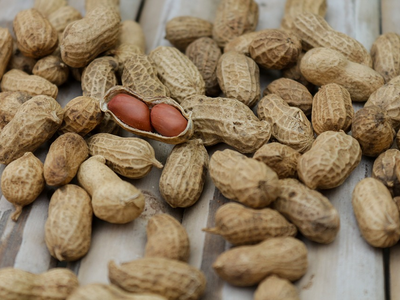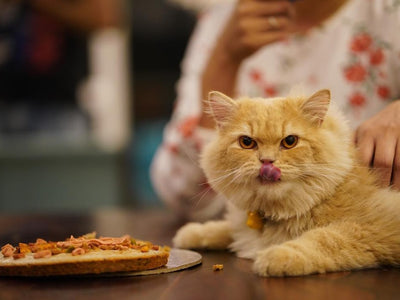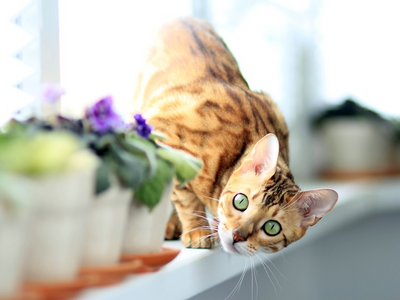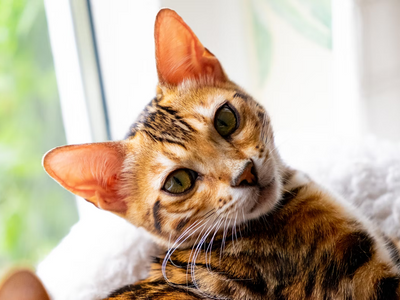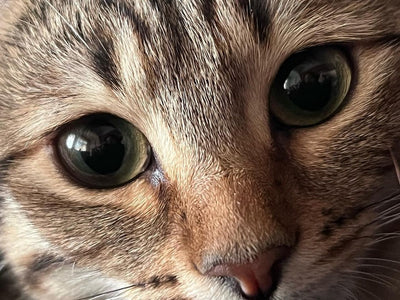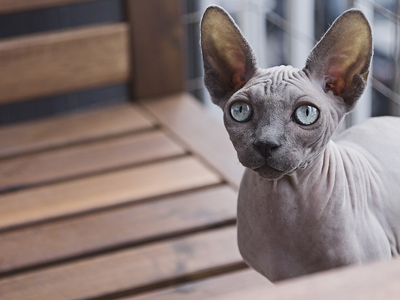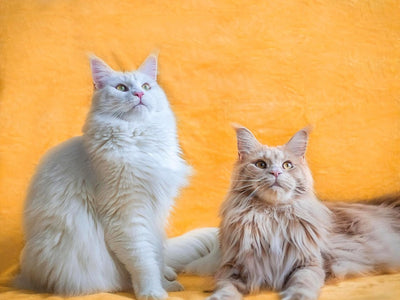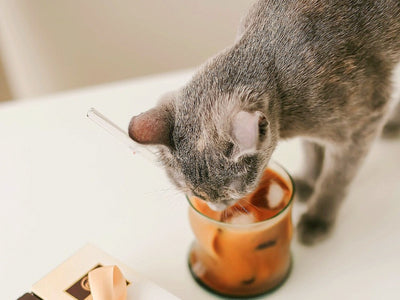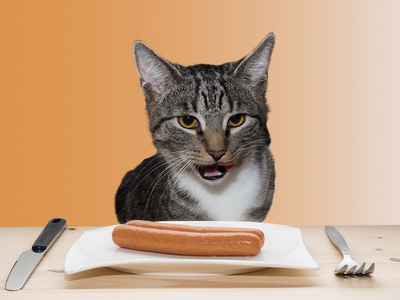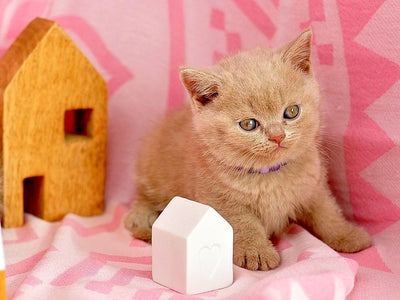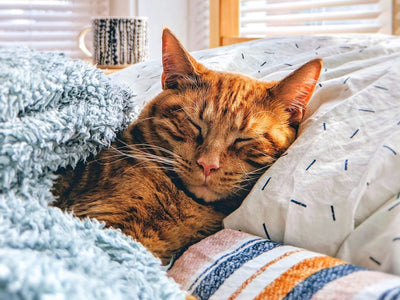29.04.2022
Everything you should know about Bengal cat food allergies
If your once energetic Bengal cat is scratching and moping around the house, they may have food allergies. The breed is prone to food sensitivities from an early age, so you’ll have to watch what you feed them.
If your cat gets itchy after every meal, it might be time to change their diet. Let’s devise the perfect meal plan for Bengal cat food allergies! We’ll look into the best diet for the bouncy spotted feline and find out which ingredients are banned from the menu!
Are Bengal cats prone to allergies?
Veterinarians are still puzzled by food allergies in felines. It’s unclear why some breeds have severe reactions to regular cat food, while others can guzzle down dirt, garden pests, or even “people food” and remain unscathed.
What’s certain is that genetics play a major role in the onset of food allergies. Like their Siamese cousins, the Bengal cat has a sensitive disposition.
In addition to food allergies, the energetic spotted feline is sensitive to:
- Pollen
- Dust mites
- Flea bites
What causes Bengal cat food allergies?

Allergies are the worst.
Source: Caleb Woods
Bengal cat food allergies are basically the feline’s body reacting to particular substances, i.e. antigens in food. The exact cause can vary, but cats can only be allergic to ingredients they are exposed to regularly. That means your pet is more likely to be sensitive to beef or turkey than foods they hardly eat.
Food allergies in felines are commonly associated with the protein in meat, dairy, and grain, especially wheat and corn. Being obligate carnivores, cats can also react poorly to carbohydrates, like the sugar in soya, starchy vegetables, and beet pulp.
How do I know if my Bengal cat has food allergies?

Ugh, I’m so itchy!!
Source: Paul Hanaoka
If you suspect your Bengal cat has food allergies, keep track of their eating habits. Watch what they eat and in what amounts to pinpoint the problematic substance. Pay attention to their behaviour after each meal, and look for the common symptoms of food allergies, namely:
- Skin inflammation or lesions—Cats with food allergies often develop rashes or lesions on the face, belly, groin, and legs after ingesting an allergen. Skin inflammations are extremely uncomfortable, so your pet may start scratching, biting, and over-grooming of the afflicted area
- Gastrointestinal problems—Bengal cat food allergies can also provoke gastrointestinal issues, like vomiting and diarrhoea, and result in appetite loss
Rashes and lesions are associated with several other conditions, such as bacterial infections, flea bites, and even diabetes. If you want to confirm your Bengal cat has food allergies, schedule an appointment with your vet. They will most likely put your cat on a six-week food trial to determine the root of the allergy. The goal is to reduce or remove all common protein sources from the feline’s diet (e.g. chicken, beef, fish, pork, etc.) and see if the symptoms disappear.
Is there a special diet for Bengal cat food allergies?
What’s the best menu for Bengal cats with food allergies? Here’s a rundown of the options:
- Hydrolysed-protein diet—The protein is broken down into almost undetectable particles and, therefore, less likely to cause a reaction. While it’s a reliable method for treating food allergies, a hydrolysed-protein diet can lead to a nutritional imbalance in the long run. Protein is responsible for muscle and tissue development and disease prevention in felines. It’s also your cat’s main energy source, and since Bengals are famous for their playful nature, they need extra fuel
- Novel protein diet—You can opt for the commercially available or home-cooked novel protein diet. The idea is to expose your cat to protein sources they haven’t eaten before. For example, instead of their regular turkey-flavoured wet food, serve them duck or venison. Novel protein meals are a great way to treat food allergies but are somewhat demanding in the long run, especially budget-wise
- Hypoallergenic cat food—Hypoallergenic cat food is free of all known allergens and typically made with a single protein source. It comes in a wide range of products, from kibble to semi-wet and wet food. While you can find hypoallergenic dry food, there are some concerns regarding its nutritional value. Being heavily processed, kibble has an inadequate moisture content of only 10%. Regular servings of hypoallergenic wet food are much closer to the feline’s natural diet
Looking for hypoallergenic food for your sensitive pet? Get Untamed!
Untamed food is designed to resemble the feline’s natural diet, providing only the finest animal protein. The natural ingredients are gently steamed to lock in the bioavailable nutrients, ensuring the final product is tasty, nourishing, and ready to be served.
We offer a wide range of allergen-free gravy and jelly recipes made with high-quality meat cuts, including:
Take our brief online quiz and get a hypoallergenic menu for your sensitive pet! Answer a few questions about your Bengal cat’s food allergies, preferences, and life stage, and select a perfect combination of our delicious products.
For the allergy-prone spotted cat, we recommend our single-protein-source recipes—Chocka Chicken and Tuck-in Tuna:
|
Our menu |
Details |
|
Chocka Chicken in Jelly |
Whole white meat dipped in appetising jelly |
|
Tuck-in Tuna in Jelly |
Dolphin-safe tuna steak in jelly, soaked in hearty fish broth |

Chocka Chicken in Jelly is our most popular single-protein-source recipe!
Image (c) Untamed
What makes Untamed food the cat’s whiskers?
Our tasty and nutritious meals are:
- Rich in animal protein—A single tin of Untamed food can deliver twice as much animal protein as the industry standard. Our food is low in carbs and all-natural
- Made with whole meat—We make each product with human-grade whole meat that’s packed with essential amino acids
- Vet-formulated—Our recipes were designed in collaboration with vets, meaning they’re free from grain fillers, animal derivatives, and other unnecessary substances
- Ethically sourced—Cats have roamed the planet for thousands of years, and we'd like to keep it that way. Our whole meats are sustainably caught, and each fish dish is dolphin-safe
- Fussy eater approved—Who says healthy food can’t taste good? The picky eater who once groaned at wet food will go wild for our feline delicacies
Besides being hypoallergenic, Untamed food can benefit your cat’s overall health. Based on client feedback, here’s how our fresh, natural ingredients can affect your cat:
|
Timeline |
Health benefits |
|
Within a week |
|
|
After two months |
|
|
Within four months |
|
|
Life-long benefits |
|

Untamed is the golden standard for feline cuisine. We only use animal protein in our recipes to cater to your carnivorous cat’s physiological needs.
Image (c) Untamed
How to join our community
Sign up for a starter pack and get monthly supplies of Untamed products. We enable easy ordering of cat food online. All you have to do is:
- Visit our Try Now page
- Tell us about your cat
- Choose the meal plan
- Place your order
Your customised meal box will arrive in a day! If you’re happy with the first delivery, you’ll start receiving monthly supplies of Untamed food.
If your cat develops a sensitivity to a particular ingredient, you can always switch to our hypoallergenic, single-protein-source recipes. Feel free to reach out, and we’ll happily change the items in your cat food subscription plan.
Are Bengal cats allergic to milk?
Bengal cats are lactose intolerant, like most breeds. The feline’s metabolism has adapted to a meat-exclusive diet, so excessive amounts of carbs can give them stomach problems. If your cat drinks a lot of milk, they can experience vomiting, diarrhoea, and abdominal pain, but that doesn’t mean they’re allergic.
Milk allergies aren’t caused by lactose but a particular protein in dairy. Cats who are allergic to milk and milk byproducts tend to have more severe reactions, including skin inflammation, itchiness, and hair loss, along with GI problems.
The key distinctions between milk allergies and lactose intolerance are listed below:
|
Lactose intolerance |
Milk allergy |
|
|
Not all dairy has the same effect as milk. The probiotic bacteria in yoghurt assists lactose digestion and can induce bowel movement in constipated cats. If your Bengal cat is allergic to casein, though—no more Activia for them.
Almond or rice milk and other vegan beverages aren’t the solution either. The average calorie content in plant-based milk is between 60 and 100 calories per cup, which is excessive, even for the active Bengals. Milk replacer formulas for kittens are the only cat-safe alternatives to milk.

What do you mean I can’t have milk? But it’s my favourite treat!
Source: Pixabay
What other foods are harmful to Bengal cats?
All cats have an innate sensitivity to these foods, but the Bengal’s congenital diseases make them especially vulnerable to:
- Citrus fruit—The essential oils in citruses can cause acute dermatitis in felines. Since Bengals are more sensitive, they can flare up from merely touching an orange peel. When ingested, the fruit can cause vomiting, diarrhoea, and other digestive problems
- Allium vegetables—Allium plants contain high amounts of oxidants that cause the breakdown of red blood cells. Regular servings of garlic, chives, onions, and shallots can cause anaemia and even kidney disease. Since they’re genetically predisposed to blood disease, allium veggies are especially dangerous to Bengal cats
- Grapes—The reason why grapes are poisonous to cats is still somewhat mysterious. Nutritional experts have recognised two possible sources of the toxicosis:
- Caffeine—Don’t share your afternoon tea with your Bengal cat because it can lead to caffeine poisoning. The spotted feline is prone to cardiac disease, and the stimulative substance is particularly strenuous for the heart. Other symptoms of caffeine poisoning include muscle tremors, hyperactivity, and even seizures

![Associated image for What human food can Sphynx cats eat? [Comprehensive list]](http://untamed.com/cdn/shop/articles/what_human_food_can_sphynx_cats_eat_Featured_400x300_crop_center.jpg?v=1648705074)
